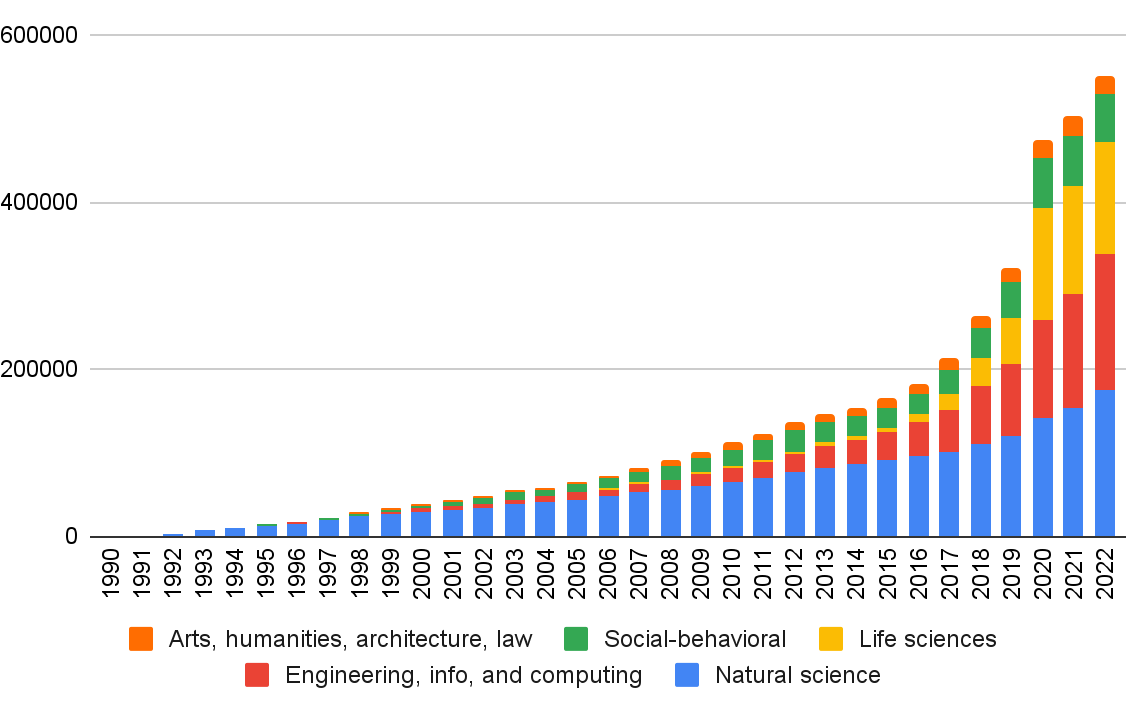 Lisa Cuevas Shaw
Lisa Cuevas ShawThe existing reward system in academic research prioritizes publication over accuracy, potentially compromising the credibility of research outcomes. This system undermines the trustworthiness of research and hampers innovation. We need a multi-pronged approach to make the necessary changes to spur and sustain open scholarship. Several evidence-based strategies offer a framework to facilitate the process.
The research environment is complex and characterized by siloed knowledge access and individual publication rewards. Open scholarship encompasses practices like data sharing, preprints, and open-access publishing, offering a paradigm shift toward transparency, collaboration, and public access to research, as specified in COS’s Theory of Change.

Growth in preprints over time
Transitioning to this model requires a strategy to encourage change at multiple levels:
Laying the foundation for open practices requires robust infrastructure. User-friendly data repositories, interoperable formats, and intuitive open-access publishing platforms are essential tools for knowledge sharing. Investment in the development and maintenance of these tools ensures accessible and reliable ways to disseminate research.
Simplified processes are vital in encouraging researcher adoption of open practices. Streamlining data-sharing protocols, simplifying pre-print submission mechanisms, and integrating open practices into existing research tools can reduce complexity and promote participation.
Cultivating a culture of openness necessitates fostering vibrant communities. Workshops, conferences, and online forums dedicated to open practices offer platforms for knowledge exchange, collaboration, and norm-setting. Recognizing and amplifying the work of early adopters and champions further encourages widespread acceptance.
Aligning incentives with open practices is crucial for sustained change. Metrics beyond traditional citation counts, such as data reuse rates and societal impact, should be actively assessed and recognized. Funding agencies and institutions can play an important role by incorporating open practices into grant selection criteria and promotion pathways.
While voluntary adoption is vital, mandating open practices through institutional policies and funding requirements can accelerate implementation. Clear guidelines for data sharing, open access publishing, and preprint deposition provide a framework for accountability and facilitate seamless integration of open practices into the research landscape.
Transitioning to an open scholarship ecosystem is an ongoing journey that requires sustained commitment. By embracing change, addressing structural impediments, and building robust infrastructure, a future where knowledge flows freely is within reach.

6218 Georgia Avenue NW, Suite #1, Unit 3189
Washington, DC 20011
Email: contact@cos.io

Unless otherwise noted, this site is licensed under a Creative Commons Attribution 4.0 International (CC BY 4.0) License.
Responsible stewards of your support
COS has earned top recognition from Charity Navigator and Candid (formerly GuideStar) for our financial transparency and accountability to our mission. COS and the OSF were also awarded SOC2 accreditation in 2023 after an independent assessment of our security and procedures by the American Institute of CPAs (AICPA).
We invite all of our sponsors, partners, and members of the community to learn more about how our organization operates, our impact, our financial performance, and our nonprofit status.